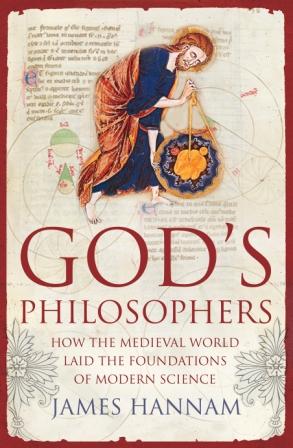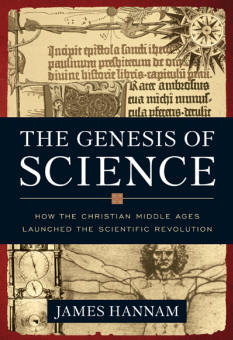
|
If you have enjoyed Bede's Library, you can order my book, The Genesis of Science: How the Christian Middle Ages Launched the Scientific Revolution (US) from Amazon.com or God's Philosophers: How the Medieval World Laid the Foundations of Modern Science (UK) from Amazon.co.uk. |
|
For my latest thoughts on science, politics, religion and history, read Quodlibeta
|
![]()
![]()
![]()
![]()
Is it reasonable to believe in a god?
![]()
Bede's negative conclusion
We have covered a lot of ground over a weekend and I hope that between us, Cygnus and I have been more enlightening than not.
There are various famous arguments for the existence of God that seem to be trotted out in these sorts of arguments. I have deliberately avoided them because the arguments (as demonstrated simply by perusing a text by Alvin Plantinga or Richard Swinbourne) have become obtuse to the point of obscurity. Philosophy on its own can convince few people of anything and this is amply demonstrated by the wide range of opinions on this and every other matter among philosophers.
Instead I have concentrated on the fine tuning argument which I find extremely convincing. But my aim was not to convince but merely to demonstrate that the hypothesis of a creator deity can take its place with other reasonable ideas about the origin and deepest structure of the universe. As I hinted earlier this deity finds itself on very similar metaphysical ground to superstrings. There is no direct scientific evidence of either but both are able to explain certain phenomena that otherwise seem inexplicable.
Cygnus has suggested that the universe's properties are more likely to be a product of random chance. Let me take a moment to explain why I disagree. Hypothesis A (that is supposed to explain X) is a good one compared to hypothesis B, if it makes X more likely than if B were true. I contend that a universe with the finely tuned life friendly properties that we see is more likely given a purposeful creator than just appearing randomly. The more fit the universe appears to be the more this argument is strengthened. Consequently, this argument is susceptible to new evidence that might cause us to lean more heavily towards other proposals. Conversely, science might reveal better evidence for design than we have already (for instance if the origin of life is found to be an easy to achieve process) and hence make a deity seem more likely. The hypothesis is therefore, to some extent, testable.
Surely in a case where we have insufficient evidence then the only recourse for a reasonable person is to admit ignorance and be an agnostic? Not at all. We don't follow this course of action with anything else, so why should we do it with a god? Are the physical theorists who chase after a Theory of Everything being unreasonable when they have no hard evidence that it exists? I don't think they are. Neither do I accept that they are just trying to find out if it does exist (worthwhile knowledge in its own right). Anyone who speaks to these researchers finds that they pursue their quarry with evangelical zeal and the thought that it might be a mirage never enters their heads. No one devotes their professional lives looking for something that might not be real - they feel it has to be there for them to find.
In every day life we make assumptions all the time about things that are more or less uncertain. It would be impossible to get through the day in any other way. Which brings me to an entirely different point about what it means to be reasonable. I am reading the biography of Bertrand Russell at the moment and it is clear that he suffered enormously for his agnosticism. His efforts to be truthful to the point of rudeness and totally rational made his life a misery and made him miserable to live with. This is not to deny the greatness of his achievements in analytical philosophy or the importance of his pacifist protest during the Great War. But none of this did Russell himself, or his nearest and dearest, any good at all. He wished for a religion to comfort him but in the name of reason refused himself that comfort. What could be more unreasonable than that?
If, as most secular philosophers would have us believe, happiness is the highest virtue then the most reasonable thing to do is that which makes us most happy. Perhaps Russell had no choice but for those of us who do, we should determine our beliefs on that basis rather than the pursuit of a mythical beast called objective truth. We are not objective creatures but the products of a history that have left us with certain needs and desires. To deny them is stupidity and every attempt to built a nirvana eliminated by the light of reason has been worse than a disaster. From a sociobiological point of view, those beliefs that survive are those that have improved the survival chances of those that carry them. This natural wisdom should be cherished rather than rejected.
That is not to say that we should continue to believe something when presented with convincing negative evidence. But the criterion for a reasonable belief is not 'overwhelming proof' as we practically never have recourse to that, but as I said early, 'consistent with the evidence and of explanatory value'. It should be noted that Cygnus has presented to us no negative evidence but rather has stated that there is an 'overwhelming lack of evidence'.
We can illustrate this principle with another example from the history of science. Early man must have believed that the Earth was a flat plate as this was consistent with what they saw in their small worlds and explained why they did not fall off. However, ancient astronomers found the evidence of the horizon and the curved shadow on the moon which convinced them that the Earth was a sphere. This explained their observations but the sphere had to be stationary to be consistent with the evidence that they were not all thrown off it by centrifugal forces or that the stars had fixed positions. Later still, Keplar, by very careful observation found that the planets' movements could only be explained by elliptical orbits around the Sun and so the Earth was sent moving. Work in mechanics in the Middle Ages had already established that a moving Earth was not, in fact, inconsistent with our not being aware of any motion. Observations of stellar parallax had to wait a few hundred years more but the lack of this observation could be explained by (correctly) postulating that the stars were a vast difference away.
None of the various cosmological proposals above were unreasonable given the state of evidence available to their proponents They could not be absolutely proved (although the last one has now been proved to a degree where it cannot be questioned) and there was debate about different models through out the Hellenistic and Medieval periods.
In summary, if it was reasonable for Thomas Huxley to believe in evolution, if it was reasonable for Ptolemy to believe his cosmology, if it is believable for Brian Greene to believe in superstrings then it is also reasonable to believe that their exists a creator deity.
Cygnus's affirmative conclusion
This has been an excellent debate and I want to thank my opponent for a fine job. While I disagree with his premises, which obviously leads me to disagree with his conclusions, it has been civil and educational. I am hoping that Bede and I can meet again on this plain for future discussions.
I believe that my position on this subject has been clear from the beginning. If we have no positive evidence for a thing that we are asked to believe, we should be skeptical. If that thing which we are asked to believe is extraordinary, we should expect extraordinary evidence. In this case, we should withhold any sort of belief until evidence comes along. A belief in an extraordinary idea that has no supporting evidence is unreasonable.
My opponent has rightly pointed out that I have brought forward no negative evidence for the existence of a god. Should this have been expected of me? Are we to now start disproving things that have no positive evidence? Must we disprove the likes of unicorns and elves or should we surmise that these things are non-existent based on the complete lack of evidence? I say the latter and believe that any rational person would agree with me.
Throughout this debate, my opponent has made several appeals that I find unreasonable. He has made an appeal to figures both living and dead who have accepted the belief in a god as reasonable. Even if every person in the history of the world believed such a thing this would not necessarily make this belief reasonable. The reasonability of this idea must stand or fall on its own.
Another appeal that was continuously made which I believe that I have disposed of was the appeal to the idea of a contingent and finely-tuned universe. In fact, I find my opponent's entire case rests on these two ideas. I would like to restate my position that to reach either of these points of belief, one must previously hold that a creator exists. I believe that this has been shown previously and only mention it in summation of the debate.
In closing, I want to state that I have never once stated that the existence of a god is impossible. This would be a mistake, in my opinion, much as it would be a mistake to state that the possible existence of unicorns or elves is completely impossible. We simply do not have the resources to check everywhere in the universe for a god. I am skeptical, however, that any of the three things mentioned - a god, unicorns or elves - exist based on the simple fact that we have no reason to believe that any of them exist other than in folklore and mythology.
Benjamin Franklin once said that the way to see by faith is to shut the eye of reason. I don't believe that a more apt quote could sum up my position on this subject.
Back to the first page of debate
![]()

